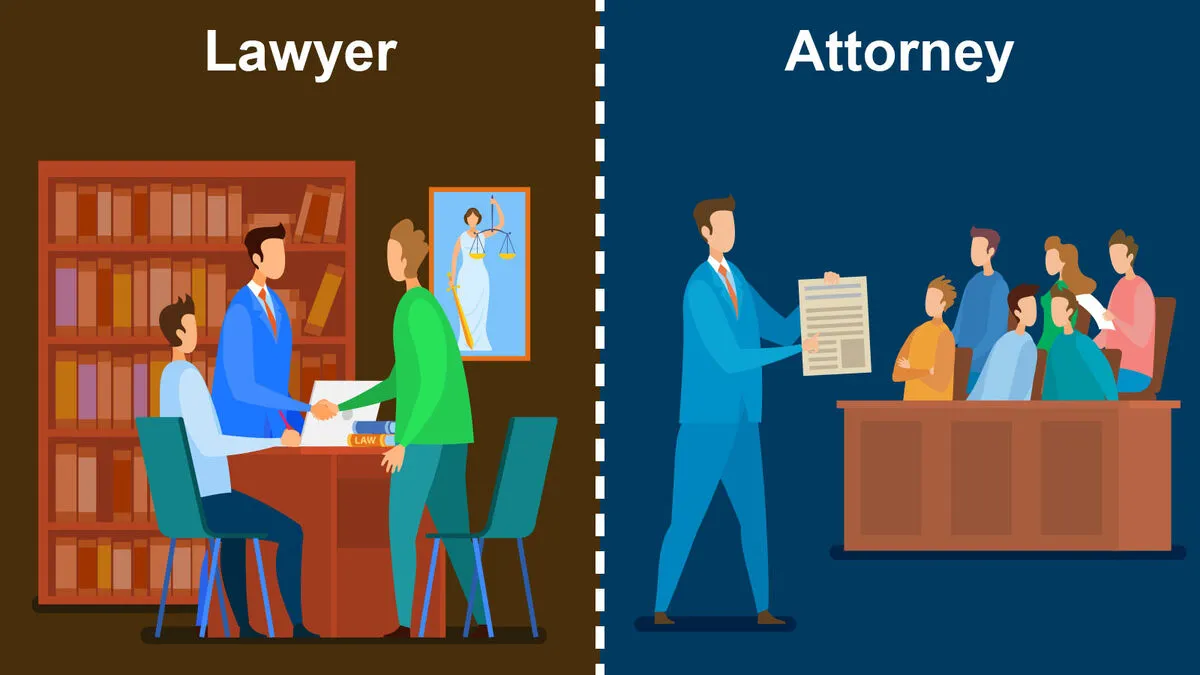Table of Contents
In the complex world of legal practice, the terms “attorney” and “lawyer” are often used interchangeably, leading to confusion among those outside the legal realm. Let’s embark on a journey of understanding the key differences in legal terminology between attorneys and lawyers.
What Qualifications Distinguish Someone as an Attorney?
Embarking on the path to becoming an attorney involves rigorous education and training. To earn the title of attorney, one typically completes a Juris Doctor (JD) degree, followed by passing the bar exam in their jurisdiction. This extensive process ensures that attorneys possess both theoretical legal knowledge and practical skills necessary for legal practice.
Is ‘Lawyer’ a General Term, or Does It Refer to a Specific Role?
While “lawyer” is a general term encompassing anyone trained in and licensed to practice law, it doesn’t specify the individual’s role. Lawyers can serve various functions, including legal advice, drafting documents, or court representation: an attorney is an attorney who has passed the bar exam and is licensed to practice law.
When Would You Seek the Counsel of an Attorney Instead of a Lawyer?
The decision to seek the counsel of an attorney or a lawyer depends on the nature and complexity of the legal issue at hand. Attorneys are often consulted for more complex legal matters requiring specialized expertise, such as litigation, corporate law, or estate planning.

Are Attorneys and Lawyers Educated and Trained Differently?
The educational paths for attorneys and lawyers are similar, involving legal education and passing the bar exam. However, attorneys typically pursue additional specialization through postgraduate studies or certifications. This additional training equips attorneys with in-depth knowledge in specific legal areas.
| Aspect | Attorneys | Lawyers |
|---|---|---|
| Educational Requirement | Completion of a Juris Doctor (JD) degree from a law school | Completion of a Juris Doctor (JD) degree from a law school |
| Bar Exam Requirement | Required to pass the bar exam in their jurisdiction | Required to pass the bar exam in their jurisdiction |
| Specialization and Postgraduate Studies | Often pursue additional specialization through postgraduate studies or certifications | May pursue additional studies but not always for specialization |
| Representation in Court | Licensed to represent clients in court | May not always be licensed to represent clients in court |
| Role in Legal Proceedings | Advocates and represents clients in legal proceedings | Can perform various legal functions, including advising, drafting, and negotiating |
| Ethical Responsibilities | Adhere to ethical responsibilities and professional standards | Adhere to ethical responsibilities and professional standards |
| Use of Title | The term “attorney” signifies a licensed legal professional with the authority to practice law | The term “lawyer” is a general term referring to anyone trained and licensed to practice law |
| Global Terminology Variation | Terminology may vary globally; in some jurisdictions, “attorney” and “lawyer” are interchangeable | Terminology may vary globally; in some jurisdictions, “attorney” and “lawyer” may have distinct meanings |
What Legal Services Fall Under the Expertise of an Attorney?
Attorneys handle a wide range of legal services, including but not limited to litigation, legal counsel for businesses, real estate transactions, and estate planning. Their specialized knowledge allows them to navigate complex legal issues with precision and expertise.
Can a Lawyer Perform the Same Functions as an Attorney?
While lawyers and attorneys share a foundational legal education, attorneys have the added distinction of passing the bar exam. This licensure enables attorneys to represent clients in court, a function reserved for those with the attorney title.
Do Attorneys and Lawyers Have Different Ethical Responsibilities?
Ethical responsibilities are a cornerstone of the legal profession, and both attorneys and lawyers adhere to a common code of ethics. However, as licensed professionals, attorneys may face additional ethical considerations based on their specialization and the jurisdictions in which they practice.

Are There Specializations Exclusive to Attorneys or Lawyers?
Specializations in the legal field can apply to both attorneys and lawyers. However, attorneys often choose a specific area of law to specialize in, deepening their knowledge and expertise in that particular domain.
In Court, What Distinctions Exist Between an Attorney and a Lawyer?
In a courtroom setting, the distinction between attorney and lawyer becomes clearer. Attorneys are licensed to represent clients in court, allowing them to advocate for individuals or entities in legal proceedings.
| Aspect | Attorney | Lawyer |
|---|---|---|
| Representation in Court | Licensed to represent clients in court | May or may not be licensed to represent clients in court |
| Advocacy Role | Advocates on behalf of clients in legal proceedings | May serve in various legal roles, including advising, drafting, and negotiating |
| Complex Legal Matters | Often handles complex legal matters requiring specialized knowledge | Can handle a range of legal issues but may not specialize in specific areas |
| Courtroom Experience | Typically has more extensive courtroom experience, as they are specifically trained for litigation | Courtroom experience may vary based on the lawyer’s practice areas and focus |
| Specialization | May specialize in specific areas of law, such as criminal law, family law, or corporate law | Can practice in various legal areas without a specific specialization |
| Authority to Practice Law | Holds a license to practice law, granting the authority to represent clients in court | May or may not hold a license to practice law, depending on jurisdiction and role |
| Legal Education and Training | Completes a Juris Doctor (JD) degree and passes the bar exam for licensure | Completes a Juris Doctor (JD) degree and may or may not pass the bar exam |
How Does the Terminology Differ Globally: Attorney vs. Lawyer?
The terminology varies globally; jurisdictions use “attorney” and “lawyer” differently. In some countries, the terms are interchangeable, while in others, they may have distinct meanings or refer to specific roles within the legal profession.
Can Someone Be Both an Attorney and a Lawyer Simultaneously?
The titles of attorney and lawyer are not mutually exclusive. All attorneys are lawyers, but not all lawyers are attorneys. The term “attorney” simply specifies that the individual is licensed to practice law.
What Educational Paths Lead to Becoming an Attorney or Lawyer?
Becoming an attorney or lawyer involves completing a Juris Doctor (JD) degree from a law school and passing the bar exam. Some individuals may pursue additional degrees or certifications to specialize in their chosen field.
When Facing Legal Issues, Whom Should You Consult: Attorney or Lawyer?
Consulting a lawyer may suffice for routine legal matters or general legal advice. However, for more complex issues or specialized areas of law, seeking an attorney’s expertise is advisable. Attorneys bring a deeper level of knowledge and experience to intricate legal challenges.
Do Attorneys and Lawyers Charge Different Fees for Their Services?
The fees charged by attorneys and lawyers can vary based on factors such as expertise, experience, and the complexity of the legal matter. Generally, attorneys may command higher fees due to their specialized knowledge and ability to handle complex legal issues.
In Negotiations, Does Having an Attorney Provide an Advantage Over a Lawyer?
An attorney in negotiations can offer a strategic advantage, especially in complex legal matters. Attorneys are trained to navigate negotiations precisely, protecting their clients’ interests and ensuring favorable outcomes.
How Do Professional Associations and Titles Differ for Attorneys and Lawyers?
Professional associations and titles often depend on jurisdiction. Some regions exclusively use “attorney,” while others use “lawyer.” Membership in professional organizations may be open to both, with specific designations based on specialization and licensure.
In conclusion, understanding the nuances between attorneys and lawyers is essential for anyone navigating the legal landscape. While both play crucial roles, attorneys bring additional specialization and licensure. Choosing an attorney or lawyer depends on the nature of the legal issue. Seeking professional advice ensures informed decision-making in legal matters.















Leave a Reply